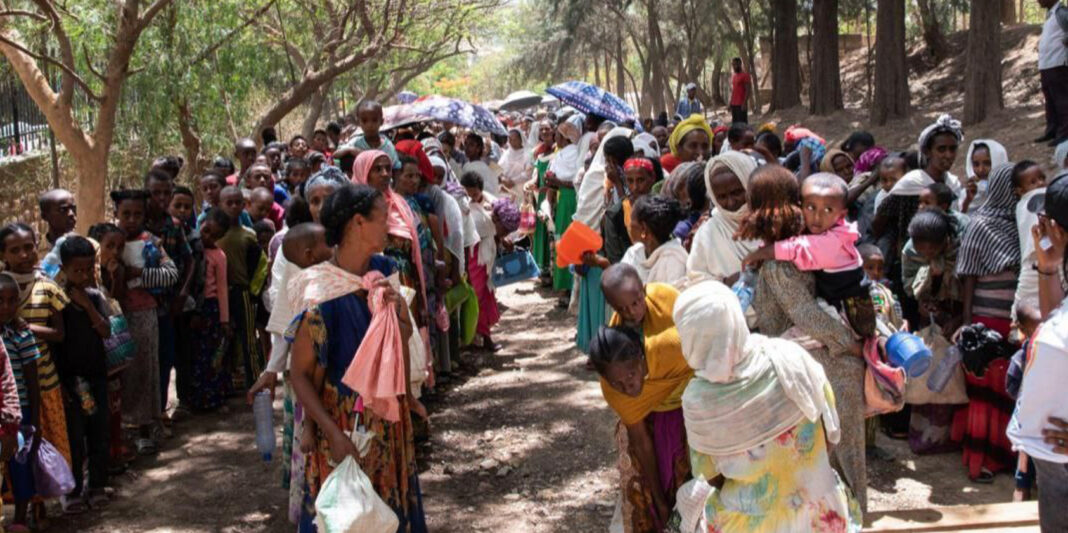Ethiopia is confronting a severe and worsening food crisis, with millions of its citizens struggling to access sufficient and nutritious food, according to the latest State of Food Security and Nutrition in the World 2025 report released last week. Rising prices for healthy foods combined with inflation are placing enormous strain on the purchasing power of average Ethiopians, pushing many into food insecurity and malnutrition.
The report, which draws on findings from the World Food Crises 2025 study, ranks Ethiopia among the top five countries globally experiencing the highest levels of food insecurity (IPC/CH Phase 3 and above) in 2024. Across 53 countries considered in crisis, approximately 295 million people face severe food insecurity, including over 35 million in emergency situations (IPC Phase 4) and nearly 2 million in disaster conditions (IPC Phase 5).
Historically, sharp declines in real food wages during the 2007–2008 and 2011–2012 food crises led to a 22% decrease in the amount of food people could afford, significantly aggravating food shortages and economic vulnerability for African families. While wages partially recovered between 2013 and 2018, surpassing inflation by 60%, a similar steep drop reoccurred in 2022, creating fresh hardships for Ethiopia’s most vulnerable populations.
Although international real wages are projected to increase moderately in 2023 and 2024, these gains have yet to meaningfully relieve pressure in Ethiopia. The report highlights troubling trends in nutritional status: after some earlier improvement, the overall prevalence of high food insecurity actually worsened from 25.0% in 2014–2016 to 28.0% in 2021. This indicates that a significant portion of the population is unable to consistently secure adequate and nutritious diets.
Child malnutrition remains a critical concern. In 2023, 37% of children under five years old were stunted, a figure nearly unchanged since 2012. While rates of wasting (acute malnutrition) have declined from 12% to 7% in the same period, sustained high stunting rates reflect long-term nutritional deficits that threaten child development.
The soaring cost of healthy food exacerbates these challenges. Measured in purchasing power parity (PPP) dollars per person per day, the price of nutritious foods in Ethiopia rose sharply from $2.94 in 2017 to $4.47 in 2024. This rising expense places healthy diets out of reach for many low-income households, forcing compromises on food quality and diversity.
Despite these concerns, the report identifies some positive developments. Exclusive breastfeeding rates among infants aged 0–5 months increased significantly from 49% in 2012 to 62% in 2023. Additionally, the incidence of low birth weight, though still concerning, has slightly improved from 15% to 14% in the same timeframe.
Nevertheless, the overall picture painted by the data remains sobering, underscoring the urgent need for comprehensive, sustained action. Experts stress that addressing this multifaceted crisis requires strengthening social safety nets, promoting sustainable and resilient food systems, and adopting policies that improve access to affordable, nutritious food for all Ethiopians.
Speaking at the second United Nations Food Systems Summit held in Addis Ababa, Prime Minister Abiy Ahmed affirmed Ethiopia’s active role in transforming its food sector. He emphasized the government’s commitment to a food systems approach focused on healthy eating, designed to tackle interconnected challenges of food insecurity, climate change, social inequality, and economic vulnerability.
Prime Minister Abiy called for predictable and affordable financing for agricultural investments, equitable access to climate-smart technologies, and fair international trade regulations to support Ethiopia’s food security goals. While Ethiopia’s proactive measures offer hope amid the crisis, the inflation-driven rise in food costs remains a formidable barrier to ensuring all citizens can access adequate nutrition.






